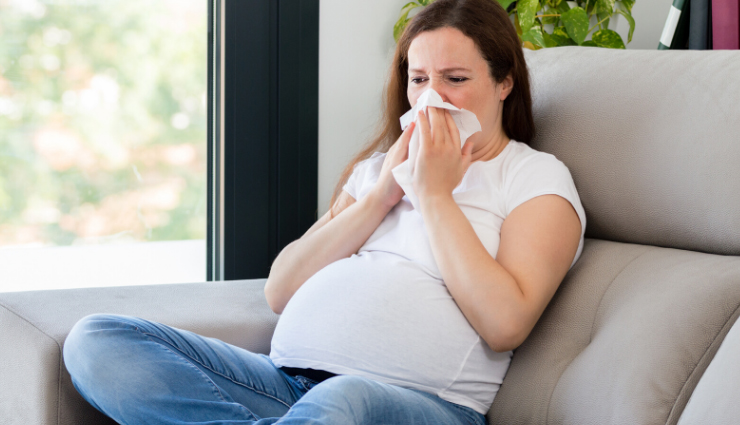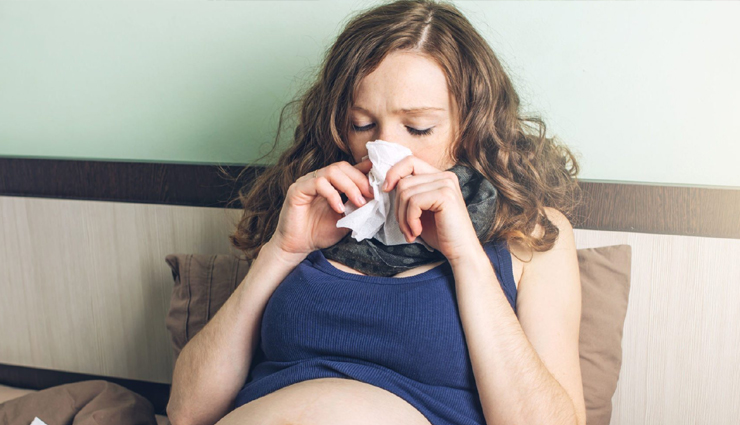- Home›
- Healthy Living›
- 4 Major Causes And 6 Home Remedies To Treat Fever During Pregnancy
4 Major Causes And 6 Home Remedies To Treat Fever During Pregnancy
By: Priyanka Maheshwari Wed, 25 Oct 2023 7:19:15

Fever during pregnancy is a condition in which an expectant mother experiences an elevated body temperature, typically defined as a core body temperature of 100.4°F (38°C) or higher. While fevers can occur at any time, they can be a source of concern during pregnancy due to their potential impact on both the mother and the developing fetus. Fever can be caused by a variety of factors, including infections, inflammatory conditions, and environmental factors.
Pregnant women are generally more susceptible to infections and fevers because their immune systems undergo changes to support the developing fetus. Fever during pregnancy can be a cause for concern, as it may lead to a range of potential complications, such as birth defects, preterm labor, or low birth weight. Therefore, it is important for pregnant women to be aware of the causes, symptoms, and appropriate management of fever during pregnancy.
In this introduction, we will explore the common causes of fever during pregnancy, the potential risks and complications associated with it, and the measures pregnant women can take to manage and prevent fever during this crucial period in their lives. It is important for pregnant individuals to seek prompt medical attention and guidance from healthcare professionals if they experience a fever, as proper diagnosis and treatment are essential to ensuring the health and well-being of both the mother and the baby.
Common Causes Of Fever During Pregnancy

# Urinary Tract Infection (UTI)
Urinary tract infections (UTIs) are a frequently encountered issue during pregnancy and can manifest with fever as one of the symptoms. The urinary tract encompasses your kidneys, ureters, bladder, and urethra, and an infection can originate from the infiltration of bacteria into this system. Most UTIs primarily affect the bladder and can display additional symptoms in addition to fever, such as:
- An intense urge to urinate
- A burning sensation during urination
- Experiencing chills
- Pelvic discomfort
- Urine appearing cloudy
- The presence of blood in the urine
When UTIs are not addressed and are allowed to persist, the infection has the potential to advance to the kidneys, leading to severe complications, including preterm labor, low birth weight in newborns, and the development of sepsis.

# Influenza
Being pregnant elevates your susceptibility to contracting the flu and experiencing severe illness because the condition is a result of a weakened immune system during pregnancy. Several typical symptoms of the flu, or influenza, include:
- A sudden onset of high fever
- Chills
- Persistent coughing
- Feelings of nausea
- Episodes of vomiting
It is crucial to address and closely observe the flu in order to diminish the likelihood of severe complications. Given the potential for the flu to cause significant illness, the CDC (Centers for Disease Control and Prevention) advises that all expectant women receive the flu vaccine.

# Upper Respiratory Infection
Another potential cause of fever during pregnancy is a viral infection affecting the upper respiratory tract, commonly known as the common cold. While upper respiratory tract infections share similar symptoms with the flu, they are typically less severe and often resolve on their own, usually within a two-week period. Some additional symptoms that can help differentiate a common cold from the flu include:
- A mild fever
- Runny nose
- A sore throat
- Mild breathing difficulties
Home remedies may often suffice for managing a common cold. However, if your symptoms persist without improvement, it is advisable to contact your healthcare provider, as upper respiratory tract infections during pregnancy may be associated with behavioral issues in childhood. In such cases, fever management may involve specific medications for maternal fever treatment.

# Gastroenteritis
A fever during pregnancy can also result from a gastrointestinal infection, which may present with more concerning symptoms like diarrhea and vomiting. Dehydration stemming from these symptoms can have significant consequences, potentially leading to contractions or preterm labor. Furthermore, a gastrointestinal infection can bring about additional severe side effects, including low blood pressure, dizziness, weakness, fainting, and electrolyte imbalances.
It is imperative to promptly reach out to your healthcare provider in the following scenarios:
- If you notice blood in your vomit.
- If you exhibit signs of dehydration, such as thirst, dry mouth, dizziness, or reduced urine output.
- If your fever surpasses 101°F.
- If you are unable to ingest food or liquids without experiencing persistent vomiting for 24 hours.
- If there is blood in your stool.
Maintaining open communication with your obstetrician-gynecologist (ob-gyn) is essential to mitigate the risk of complications. Increasing your fluid intake and possibly transitioning to a bland or BRAT (bananas, rice, applesauce, toast) diet can provide natural support for your prescribed treatment.
Depending on the underlying cause of your pregnancy fever, you may need to collaborate with your ob-gyn, even when it comes to over-the-counter medications. This is because certain commonly used over-the-counter remedies for fever and other symptoms may not be considered safe during pregnancy. Furthermore, there are numerous home-based measures you can adopt to naturally alleviate fever.
Best Home Remedies To Treat Fever During Pregnancy
- Gently place a moistened washcloth on your forehead while lying down. Leave it there for a minute, then dip it in cool water, wring out excess water, and place it back on your forehead.
- Opt for a lukewarm bath, either by soaking in a bathtub or taking a sponge bath. Avoid using cold water or rubbing alcohol to reduce your fever.
- While drinking may seem like a task, make an effort to consume ample fluids to maintain hydration and facilitate internal cooling.
- If available, switch on a fan and set it to a comfortable speed. This can assist in lowering your body temperature and promoting cooling.
- Wearing lightweight clothing is a fundamental aspect of self-care. If you experience chills, wrap yourself in a light blanket until you feel comfortably warm, and remove it if you become too warm.
- Stay indoors, away from direct sunlight and heat. In the evening, seek out a cool and cozy place to rest.





